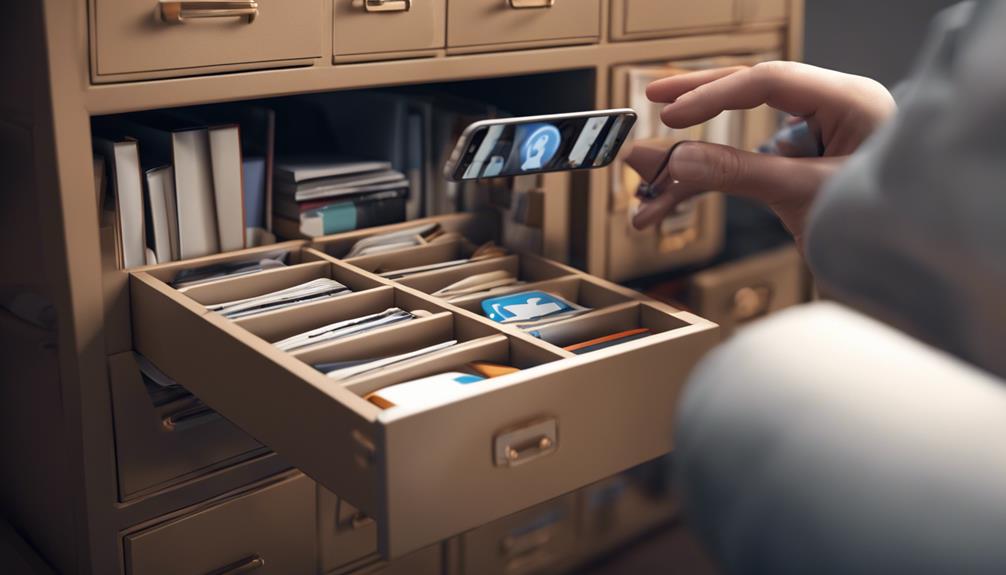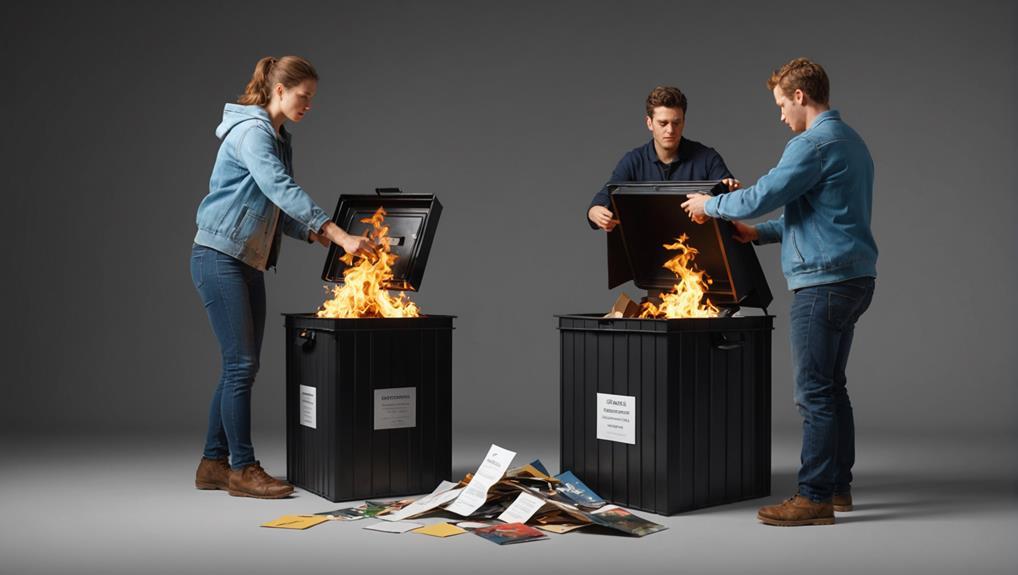
When you archive someone's content on social media, they aren't notified. This feature is brilliant for managing your digital space discreetly, allowing you to maintain a curated online presence without hurting anyone's feelings. It's all about cleaning up your profile while keeping your connections intact. No one knows if you've tucked their content away unless you choose to tell them. Archiving helps balance your personal boundaries with continuous engagement in your community. Curious about the broader impact this could have on your online relationships and how else you can navigate your digital interactions? There's more to uncover that can enhance your online experience.
Understanding Social Media Archiving

To understand social media archiving, you must first know it allows you to hide posts from your timeline without deleting them. It's like tucking away those old high school photos or awkward party snaps into a private album where only you can see them. This feature is invaluable when you're looking to clean up your digital presence or curate your personal story without losing memories.
Think of it as organizing your virtual space—keeping what matters visible and stowing away the rest, just for you. It's about control and creating a space that truly reflects who you are now, without erasing who you were. Everyone's journey is filled with moments both share-worthy and those best kept private, and archiving lets you manage these with ease.
Using this tool, you're not just tidying up; you're crafting your image within your community, ensuring that what people see is in sync with the identity you want to project. It's a way to stay connected, yet still maintain personal boundaries and privacy. Archiving isn't about losing parts of your journey; it's about highlighting the chapters that you feel most define you at this moment.
User Notifications and Privacy
Now that you understand social media archiving, let's explore how it affects notifications and your privacy. When you archive a post or a conversation, it's like you're tucking it away into a private folder. Most importantly, the original senders or tagged individuals aren't notified. They won't know you moved their content unless you decide to tell them. This feature is designed to give you control over your digital space without broadcasting every change you make.
This discreet approach helps maintain a sense of community and connection. You're able to curate your visible content to align with your current feelings and social circles without the worry of offending someone. Imagine you're part of a group that values constant engagement and sharing. If you suddenly removed content with someone tagged, it might raise questions or even hurt feelings. Archiving sidesteps this by keeping changes invisible, ensuring you don't disrupt the harmony within your network.
Archiving Vs. Deleting: Key Differences

Understanding the key differences between archiving and deleting content can help you better manage your online presence. When you archive something, you're tucking it away for potential future use. It's not gone; it's just out of sight. Think of it as storing your winter clothes during summer – they're not on display, but they're there when you need them. This is perfect if you want to clean up your digital space without losing memories or information.
Deleting, on the other hand, is like throwing something out. Once you delete a file or a post, it's usually gone for good. This is a good option if you're sure you won't need that item again and you're looking to declutter permanently. Remember, deleting can sometimes be undone, but typically, it's as final as it gets in the digital world.
Each option has its place. Archiving is your go-to when you might want to revisit or reactivate something later. Deleting is for when you're ready to let go completely. Choosing between the two can make your digital life feel more controlled and truly yours. You're in charge of what stays and what goes, ensuring that your online environment reflects your current self.
Impact on Digital Relationships
Archiving or deleting digital content significantly affects your online interactions and relationships. When you choose to archive messages or posts, you're subtly shifting how you manage your digital footprint, often safeguarding your own emotional space. However, this act can sometimes leave your friends feeling confused or marginalized if they notice their interactions with you have disappeared or changed.
Think about it—when you're on the receiving end, finding out that you've been archived might make you feel like you're being pushed to the sidelines of someone's digital world. It can stir up feelings of rejection and raise questions about where you stand in that relationship. You might wonder, "Am I not important?" or "Did I do something wrong?"
Conversely, when you're the one doing the archiving, it might feel like a necessary step for maintaining your mental well-being, especially in a world where online interactions can often become overwhelming. Balancing your digital presence while keeping everyone's feelings in mind is tricky. It requires a thoughtful approach to ensure you're not unintentionally hurting someone who values their connection with you. Remember, every click affects a real person on the other side.
Managing Online Interactions Discreetly

You can manage your online interactions discreetly by choosing when and with whom to share specific content. It's all about creating a space where you feel safe and respected. Sometimes, you might want to engage with friends and family without making everything public. By customizing privacy settings on various platforms, you can control who sees your posts and personal information. This method ensures that you're not oversharing with acquaintances or the broader public, keeping your personal space just that—personal.
When you feel overwhelmed by the constant notifications and interactions, it's perfectly fine to take a step back. You don't always have to be "on." Setting boundaries around how and when you interact online can help you manage your social circles more effectively. It allows you to nurture the relationships that truly matter without feeling stretched too thin.
Best Practices for Archiving Content
To effectively manage your digital footprint, it's crucial to know the best practices for archiving content. In this connected world, where every post and picture contributes to the community tapestry, understanding how to archive thoughtfully ensures you remain a valued part of your digital circles while keeping your space organized.
Firstly, always consider the value of the content you're keeping. Does it enhance your shared experiences? Is it something that contributes positively to the group's memory? If it's not serving a purpose or bringing joy to you or your community, it might be time to let it go.
Secondly, organize your archives. Use tags or folders based on events, dates, or themes. This helps not only in decluttering your digital presence but also makes it easier for you to revisit cherished memories with friends and family. It creates a sense of belonging and continuity, reinforcing the bonds through shared digital histories.
Lastly, make sure your archiving methods respect privacy and consent. Before you archive shared content, check if everyone involved is comfortable with it being saved. This practice not only builds trust but also strengthens the community feeling, as everyone feels safe and respected in their digital interactions.
Conclusion
You've now learned that archiving content on social media doesn't notify the person involved, helping you manage your digital landscape discreetly. Unlike deleting, archiving keeps your interactions private without permanent removal. Remember, this tool impacts relationships subtly, allowing you to curate your online presence thoughtfully. So, always consider your motives and the potential effects on digital relationships when you choose to archive. Use this feature wisely to maintain harmony and respect in your online interactions.






